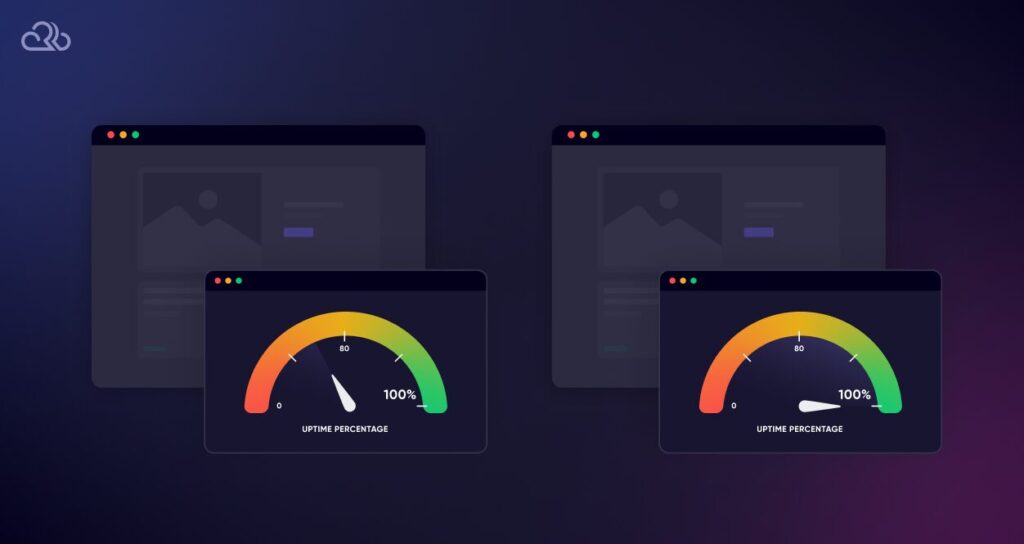Have you ever wondered why selecting a web host is such a pivotal decision in the journey of creating a website? It might seem like just another step in the checklist of creating your dream website, but the truth is, your choice of web hosting service is fundamental to the success and reliability of your website.
Whether it’s a vibrant blog, a sleek portfolio, or a bustling online store, the web host you choose not only houses your digital creation but also ensures it’s accessible, secure, and fast for anyone who visits. The web hosting industry is scaling fast, and here’s a striking example of that:
The global web hosting industry hit a staggering $108.54 billion in 2023.
Let’s explore the crucial role a web host plays in the life and performance of your website, setting the stage for a deeper understanding of its indispensable value.
Understanding What is Web Hosting?

When a website is created a lot of files need to be stored “somewhere” from where everyone can access those files. When you purchase certain space from website hosting providers, they will “host” your website’s files on their servers. The amount you have to pay these hosting providers can be paid in monthly or yearly installments.
Let’s make it clear with an example –
Imagine website hosting as an automobile fair. The whole area allotted for this fair is the web server maintained by the web hosting providers. Normal people have access to this fair as the route is created by the hosting companies. Each of the automobile display pavilions are websites that are full of various types of automobiles or in this case, pages and files of the website.
So in general to sell automobiles, you need to reserve a pavilion first, and when it comes to a website, you have to host it via a reliable hosting provider.
Now that you know how websites are hosted, you get an idea about why it is important to use one, but you also need to have a basic idea of the types of hosting services.
Different Types of Website Hosting

Web hosting can be categorized into various categories and subcategories. Four of the main hosting types are –
Shared Hosting:
One of the most common and inexpensive types of hosting is shared hosting. As you know, websites need to be hosted on a web server, when multiple websites get hosted on the same server it’s called shared hosting.
Shared website hosting is most suitable for personal websites, small businesses and start-ups, etc.
Dedicated Hosting:
Dedicated hosting is just an alternative to shared hosting. From the name, you understand here that each website has its own hosting server. Dedicated hosting definitely has more options and benefits than shared hosting. But it’s more expensive too.
Mostly medium to larger businesses, e-commerce sites and professional support-type websites are suitable for dedicated hosting.
VPS (Virtual Private Server) Hosting:
VPS (Virtual Private Server) is a hybrid hosting service that stands in the middle point between shared web hosting and dedicated web hosting. In this type of hosting facility, all the hosted websites share the same physical server space, but each of them has their own independent virtual space.
In a more simplified way, VPS website hosting virtually represents the environment of a dedicated server within a shared server.
Cloud Hosting:
In the era of cloud-based services hosting providers also scaled up from the traditional concept of renting space from one physical server. A cloud server hosts a website via a network of connected virtual and physical cloud servers. These types of servers are not only providing greater reliability for the hosted server. This type of web server is also renowned for better flexibility, scalability, and security.
What Qualities You Need to Check on a Web Host?

When venturing into the vast digital landscape, your choice of a web host can significantly influence your website’s performance, reliability, and user experience. Here are some essential qualities and factors to consider when choosing a web hosting provider:
Here, we will discuss some essential features of web hosts that you must look for if you want to boost your site’s potential.
Search for “Real” Bandwidth Limit
Bandwidth means the capacity of your website to accommodate traffic and the number of page views each month. You can choose specific bandwidth from your hosting providers as the charge varies based on that. But it’s important to note that in cases of sudden, significant traffic spikes for example, during holiday sales or if a blog post becomes highly popular – your site could face slowdowns or even go offline if it does not have proper bandwidth.
So before selecting a website hosting provider, especially shared hosting, look for the packages properly. It may mention unlimited bandwidth, but this ‘unlimited’ may have its limits. Typically, a website on a basic shared hosting plan can manage around 30,000 visitors per month before experiencing slower loading times and reduced performance. If your site reaches this level of traffic, it’s high time to consider upgrading to a more advanced hosting package.
You can also read – https://rapyd.cloud/fast-server-speed-tools/
Estimate Your Desired Storage
Storage limits differ among hosting packages, but they are generally less complicated than bandwidth limits. Unless you intend to store numerous high-resolution videos, store a large volume of user information, or operate a large-scale e-commerce site, a modest storage plan from your hosting provider should suffice.
Your site should operate smoothly within your chosen storage capacity provided by the web hosts unless you excessively increase the content on your website.
Look for a Proper Site Management Dashboard
When choosing a hosting provider, it’s crucial to think about both your current needs and future growth. To boost your site’s potential, proper site management is essential. You may start with hosting for a single site, but in the future, you might need to register multiple domains or set up subdomains under a main site. These tasks require a dashboard that facilitates easy management of your websites.
Therefore, before committing to any web host, ensure that their service allows the inclusion of multiple domains in a single hosting account. Often, hosting packages may restrict you to using a single domain. It’s advisable to select a hosting provider that offers the ability to add multiple domains and provides a website management tool with a user-friendly interface.
Make Sure about the offering of Professional Email Addresses
Web hosting companies often offer an email hosting feature, allowing you to create professional email addresses using your own domain name, such as info@yourwebsitename.com.
Having such a professional email address enhances your brand image and lends a unique credibility to your business. Therefore, when selecting a web host that can boost your site’s potential, ensure that they also offer email services.
Evaluate Average Uptime and Response Rate if the Site Gets Down
One of the least desirable scenarios for any website is unexpected downtime, making the site inaccessible to users. This not only disrupts user experience but also negatively impacts the site’s SEO. No duration of downtime is acceptable. In a reliable web hosting provider, you should seek an average uptime of at least 99%.
Additionally, it’s important to consider their response services. When your site goes down for any reason, how quickly the hosting provider can restore it to live status is a crucial factor to evaluate.
Find Who Offers Accurate Price with No Hidden Charges
The cost of hosting can naturally increase over time, especially if you don’t purchase multi-year packages upfront. However, renewal or installment charges can sometimes be unexpectedly high due to hidden fees. It’s important to sign up with hosting providers who offer clear pricing and transparent terms.
This way, you can make informed decisions about which package to choose and anticipate any potential price increases.
Keep the Option to Scale Up
As your site grows with time and attracts more traffic, your needs from a web host service provider will change. You might find yourself needing to migrate from a shared hosting plan to a specialized WordPress hosting or a cloud hosting service.
So while choosing a website host, ensure they offer scalable packages. This means they provide options for users to upgrade from one hosting plan to another. As a paid user you always have the option to switch hosting providers, it’s much more convenient to select a host that can accommodate your long-term needs.
Get Sure About Customer Support
Before settling on a hosting provider, it’s wise to test their support system. You can do this by submitting a question or two and assessing whether their support process meets your expectations. For instance, some web hosting companies provide support exclusively through email or ticketing systems, while others offer live chat or phone support.
It’s crucial to ensure that the company you’re considering for your website’s hosting can deliver the level of support you need when you need it.
How Choosing the Right Web Host Can Boost Your Site’s Potential?
Just choosing a website host does not make your website become recognized, but choosing the right one can help you boost your site’s potential.
Boost Site Performance and SEO:

A website’s loading speeds and search engine rankings and interrelated. Slow-loading sites can result in high bounce rates and poor user experience, adversely affecting SEO. While factors like site design or excessive plugins can contribute to sluggish performance, the hosting service often plays a significant role. If your optimized site still underperforms, it might indicate the need to switch to a more capable host or upgrade your hosting package.
Remain Trustworthy with High-Class Security:

Strong security provided by web hosts is crucial for preventing data breaches and hacking. Affordable hosting plans should still offer key security features like malware protection, SSL certificates, and effective firewalls. There’s no perfect security solution, but combining these hosting features with actions like regular updates and using security plugins greatly strengthens your website’s defenses.
This approach not only keeps your site safe but also boosts its credibility and trustworthiness with users, which is essential for its potential. The host’s commitment to high-quality security is like having a thorough, easy-to-use security system for your online presence, creating a secure and dependable environment for your website’s growth and success.
Minimize the Loss of Sales:

The uninterrupted uptime of your website is intrinsically linked to the success of your online business, especially in generating leads or sales. The right web hosting provider should guarantee an uptime of 99.9%, ensuring that your website is consistently available to users. Frequent downtime, unless caused by factors within the site owner’s control, is a clear indicator that a more robust hosting package or a switch to a more dependable host is necessary.
This aspect is particularly crucial for e-commerce websites, where every minute of downtime can result in significant revenue loss. A reliable host minimizes these disruptions, directly contributing to the website’s potential to attract and retain customers. Moreover, consistent uptime is vital for maintaining customer trust and satisfaction, which are key drivers of repeat business and positive word-of-mouth.
Web Hosting Selection Tips for New Users

Sort out Your Website’s Specific Needs
Take time to evaluate what your website truly requires in terms of traffic handling, storage capacity, software compatibility, and security measures. This will help you zero in on a hosting plan that fits perfectly.
Search and Analyze Hosting Providers
Dive into user reviews, weigh up the different features, and ponder the overall standing and trustworthiness of various hosting providers. This due diligence is key in making an informed choice.
Get Proper Knowledge of the Types of Hosting Available
Make an effort to understand the array of hosting solutions out there, ranging from shared to cloud hosting, and pick one that suits both your current requirements and potential future expansion.
Focus on Support Quality and User Feedback
Place a high emphasis on accessible and efficient customer support. Seek out and consider feedback from current users to get a sense of their experiences and level of satisfaction.
Try Out Some Hosting Service First
Many hosting services provide a trial run or a refund policy. Use these opportunities to thoroughly test the hosting service, paying special attention to its performance and the quality of support provided.
Frequently Asked Questions
Web hosting is a service that allows your website to be stored and accessible on the internet. It’s essential because, without it, you cannot store your website data somewhere everyone can access it.
The right web host can improve site speed, ensure high uptime, and enhance the overall user experience.
Premium hosting often offers better performance, security, and features, which can be worth the extra cost, especially for larger sites.
Regularly review your hosting needs, especially when your site grows or changes, to determine if a switch is necessary.
Final Words
Deciding on the right web hosting is a vital step for your website. Instead of just picking the cheapest option, take the time to research and find the best fit for your needs. While you can always switch hosts later, choosing wisely the first time is easier and helps you make the most of your website’s potential. This careful choice sets the foundation for your site’s success.







